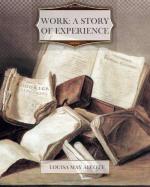A great Christmas spectacle was brought out the next season, and Christie had a good part in it. When that was over she thought there was no hope for her, as the regular company was full and a different sort of performance was to begin. But just then her chance came, and she “grabbed it.” The first soubrette died suddenly, and in the emergency Mr. Sharp offered the place to Christie till he could fill it to his mind. Lucy was second soubrette, and had hoped for this promotion; but Lucy did not sing well. Christie had a good voice, had taken lessons and much improved of late, so she had the preference and resolved to stand the test so well that this temporary elevation should become permanent.
She did her best, and though many of the parts were distasteful to her she got through them successfully, while now and then she had one which she thoroughly enjoyed. Her Tilly Slowboy was a hit, and a proud girl was Christie when Kent, the comedian, congratulated her on it, and told her he had seldom seen it better done.
To find favor in Kent’s eyes was an honor indeed, for he belonged to the old school, and rarely condescended to praise modern actors. His own style was so admirable that he was justly considered the first comedian in the country, and was the pride and mainstay of the old theatre where he had played for years. Of course he possessed much influence in that little world, and being a kindly man used it generously to help up any young aspirant who seemed to him deserving.
He had observed Christie, attracted by her intelligent face and modest manners, for in spite of her youth there was a native refinement about her that made it impossible for her to romp and flirt as some of her mates did. But till she played Tilly he had not thought she possessed any talent. That pleased him, and seeing how much she valued his praise, and was flattered by his notice, he gave her the wise but unpalatable advice always offered young actors. Finding that she accepted it, was willing to study hard, work faithfully, and wait patiently, he predicted that in time she would make a clever actress, never a great one.
Of course Christie thought he was mistaken, and secretly resolved to prove him a false prophet by the triumphs of her career. But she meekly bowed to his opinion; this docility pleased him, and he took a paternal sort of interest in her, which, coming from the powerful favorite, did her good service with the higher powers, and helped her on more rapidly than years of meritorious effort.
Toward the end of that second season several of Dickens’s dramatized novels were played, and Christie earned fresh laurels. She loved those books, and seemed by instinct to understand and personate the humor and pathos of many of those grotesque creations. Believing she had little beauty to sacrifice, she dressed such parts to the life, and played them with a spirit and ease that surprised those who had considered her a dignified and rather dull young person.




